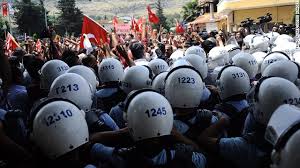Protesters clash with police in Turkey
Four biggest unions hold strike over explosion in coal mine that has left at least 283 people dead and scores trapped.
Anti-government protesters angered by the deaths of at least 283 workers in Turkey’s worst mining disaster have clashed with police across the country.
In the western city of Izmir, about 100km from Soma, which was hit hard by Tuesday’s mine explosion, police fired tear gas and water cannon at around 20,000 protesters on Thursday.
Turkey’s four biggest unions held a one-day strike, saying workers’ lives were being jeopardised to cut costs, and demanding those responsible for the collapse of the coal mine be brought to account.
“Hundreds of our workers have been left to die from the very beginning by being forced to work in cruel production processes to achieve maximum profits,” they said in a joint statement, calling on people to wear black.
On Friday, Turkey’s Energy Minister Taner Yildiz said that a maximum of 18 miners remain trapped underground and he expects the final death toll to be around 300.
Although he did not spell it out, Yildiz’s comments suggested that no one else was expected to come out alive from the mine.
Speaking from Soma on Thursday, Al Jazeera’s Caroline Malone said the feeling was one of helplessness and despair.
“One man who was a team leader of miners still trapped inside the mine has been on site for two days, feeling incredibly helpess after not being able to do anything,” she said.
Anger at the disaster has swept across Turkey, where mine explosions and cave-ins are a frequent occurrence.
In Izmir, the 61-year-old head of one of the main unions Kani Beko was hospitalised after violent clashes with riot police.
In Ankara, police fired tear gas and water cannon on around 200 protesters accusing the government and mining industry of negligence.
Recep Tayyip Erdogan has rejected claims of government culpability, saying that “such accidents happen”.
He compared the collapse to 19th-century mining disasters, saying that “204 people died in the UK in 1862 and 361 people in 1864”, in an apparent attempt to downplay its severity.
Erdogan was forced to take refuge in a shop after a furious reaction from relatives of the victims and the missing, some of whom began kicking his vehicle.
Photographs of his adviser Yusuf Erkel kicking a protester in Soma caused outrage on social media.
Defending his actions, Erkel told Hurriyet newspaper: “He attacked and insulted me as well as the prime minister. Should I have stayed silent?”
At a protest in central Istanbul on Thursday near Taksim square, the site of weeks of violent anti-government protests last year, angry demonstrators held the country’s leaders responsible for the disaster.
Al Jazeera’s Anita McNaught, reporting from Istanbul, said: “Erdogan implied yesterday in his speech that this accident was just one of those things, and that mining is difficult and the industry is inherently dangerous. He rather oddly quoted figures from Victorian England on mining accidents.
“In October last year, the opposition tabled legistlation to improve mining conditions in Soma, but two weeks ago the government threw it out. The public believes mining is a problem.”
President Abdullah Gul, on a visit to the mine, pledged action to prevent further such accidents.
“Whatever necessary will be done. We need to review all the regulations, like all developed countries do, so that these accidents do not happen again,” he said.
It is unclear how many workers were still trapped underground following the blast believed to have been set off by an electrical fault.
Mining operators put the figure at 90, but reports from rescue workers suggest the figure could be much higher. Most miners died of carbon monoxide poisoning.
Kemal Ozkan, assistant general secretary of the international trade union federation IndustriALL Global Union, said the “staggering” number of fatalities made the mining disaster the worst in recent memory.
“Turkey has possibly the worst safety record in terms of mining accidents and explosions in Europe and the third worst in the world,” he told AFP in a statement.
He added it was “made all the more tragic by the seemingly uncaring attitude of the government and mining companies”.
The disaster has added to the huge political pressure on Erdogan, two weeks before the first anniversary of the start of mass anti-government protests in Istanbul and after a corruption scandal involving his family and key allies in recent months.
Intensifying the pressure on Erdogan, local media reported that the general manager of the mine operator Soma Komur, Ramazan Dogru, was married to a member of his ruling Justice and Development Party (AKP).
Sinan Ulgen, head of the Istanbul Centre for Economics and Foreign Policy Studies, warned the government would struggle to contain the fallout from the disaster.
Early reports said 787 workers were underground when the blast occurred. By late Wednesday, “close to 450” workers had been rescued, according to Soma Komur.
But accounts from rescue workers cast doubt over these numbers.
Erdem Bakin, a doctor with the Search and Rescue organisation, said only around 70 to 80 people who were between the mine entrance and the transformer that exploded had survived.
The prosecutor’s office in Soma, a key centre for mining lignite, a type of coal, has launched an investigation into the disaster.
The main opposition Republican People’s Party (CHP) said it asked parliament last month to investigate work-related accidents at coal mines in Soma, but the government turned down the request.
“We receive tip-offs every day that workers’ lives are under threat,” Ozgur Ozel, local CHP legislator, told Turkish media.
Turkey’s Ministry of Labour and Social Security said the Soma mine had been inspected eight times in the last four years, most recently on March 17, and was found to comply with safety regulations.

